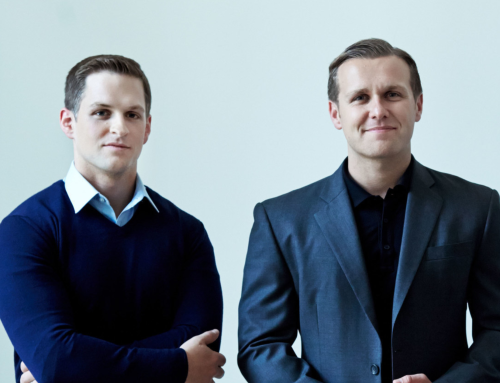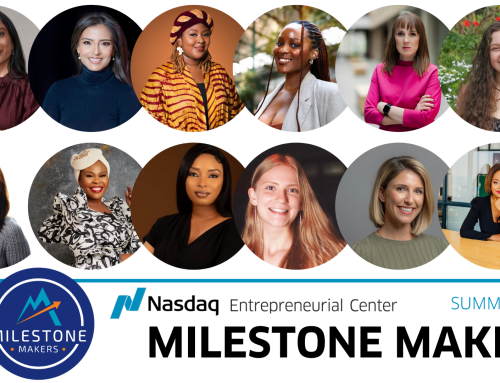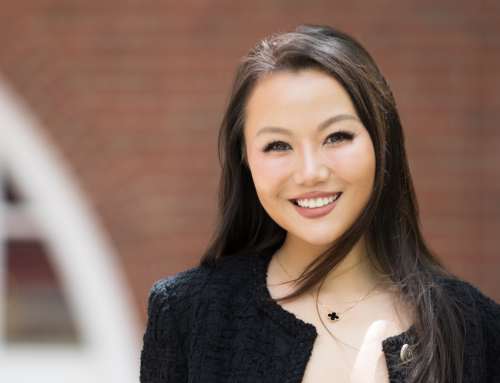Sneha Saigal is the co-founder and CEO of Geeks and Experts, a platform for startups and scaleups to hire fractional PR talent on a contract basis. Sneha has over a decade of experience working in early-stage and VC-backed companies across industries, from food tech to social impact, and obtained her MBA from IESE Business School in Spain. Apart from being a wine sommelier, Sneha is also a top writer on Medium where she writes about entrepreneurship, immigrant founders, and the future of work.
 What does “entrepreneurship” mean to you?
What does “entrepreneurship” mean to you?
Sneha Saigal: Entrepreneurship is a vessel for self-growth and discovery. It means signing up for a thrilling journey to a destination where there are only lessons, not losses.
Tell us about your first experience with entrepreneurship.
SS: I piloted the first-of-its-kind Liberal Arts in Prison Program at Grinnell College in Iowa, where undergrad students went into correctional facilities to teach Mathematics to incarcerated men. Seeing the life-changing impact this had on people was an eye-opener for me and I knew then that even a small initiative can positively affect the world, and I wanted to play my role in it! It is what led me to begin my career in the social impact space and even today; I am a firm believer in doing well alongside building a sustainable and profitable business.
What is your company’s origin story? What is the biggest reason you started your business?
SS: As an immigrant founder and a woman of color, I understand how challenging it is to get representation in the media. I’ve also worked in marketing and public relations at early-stage companies and understand the dynamic needs of these companies that have tighter budgets but still want to leverage the power of visibility to grow their businesses with the right resources.
My cofounder and I started Geeks and Experts to tell the meaningful stories of startups and scale-ups creating impact in the world by matching them with PR specialists with finessed media relations and a proven track record instead of signing annual retainers with traditional agencies or spending money on paid media. Our goal is to ensure a value-based alignment between clients and fractional talent, all while getting measurable results without breaking the bank.
What did those early days look like and teach you?
SS: The early days were the most defining and pivotal moments for our startup. Every idea needs rapid prototyping and iterations! We quickly understood that moving faster could only be possible if we picked key metrics, tested hypotheses, and led with our earned insights. Most importantly, how you manage your pivot is not as important as why you believe you should pivot. Pivots are messy. So, identify the customers’ needs and market demands and move fast.
What do you wish you knew when you started? Is there anything you would do differently?
SS: I wouldn’t be so afraid to mess up! I wouldn’t worry about competition. I wouldn’t care about what people think. The spotlight effect makes us falsely believe that a lot more people care about us and are watching our next move closely. In reality, the only thing that matters is whose problem you are solving and how – even if it is taking one customer from Point A to Point B.
If I were to start again, I wouldn’t try to boil the ocean and try to be everything for everyone and build the ideal product – instead, I’d niche down and build case studies and generate revenue.
What does “success” look like for you? We’d love to hear your biggest, boldest dream. What do you think will help you achieve it?
SS: Success to me means getting more and more people to notice and celebrate the unsung heroes, minority groups, and underrepresented founders who are launching and scaling revolutionary companies. I am confident that this dream can come to fruition with the right strategic partners.
What is your superpower as an entrepreneur? What is your proudest and darkest moment so far? Share a key high and a key low from your journey if you can.
SS: My superpower is that I am not afraid to ask. I am not afraid to ask for help, ask for advice, or ask for an introduction. I believe that if you don’t ask, the answer will always be no. Instead, go the extra mile and get out of your comfort zone to pitch to that podcast, write to that journalist, send that cold email, or write to that investor, and so on. You never know what the answer will be!
My proudest moment so far is seeing one of our clients win a life-changing grant for her startup through the work we did to highlight her phenomenal background and share her background story. It is the most rewarding feeling to see the impact you can create through meaningful work.
The most challenging moment was burning time during several pivots – we almost decided to shut down the business when we lost some contracts overnight and had to make some hard pivots. It solidified my belief that entrepreneurship is where uncertainty meets resilience and patience!
What are your personal driving principles, your top values?
SS: I am very proud of a recent mindset shift that I have adopted lately, which is that you are a perfect work-in-progress. This has become my go-to guiding principle to embrace any opportunity or challenge that comes my way with a growth-mindset. Things take time, and then some more. Working with integrity and patience is a virtue I am starting to develop and respect, and it has been most rewarding to focus on the input rather than obsessing about the output.
How have your personal principles and values shaped your company’s values and principles? Give us some examples.
SS: One of the fundamental principles at Geeks and Experts is a dedication to continuous improvement, driven by my personal belief in the power of learning. I am learning to lean into my curiosity, adapt to new environments and not be afraid of failing at anything new. For instance, my cofounder and I adopted agile development tools to iterate our product and move faster – it was the only cost-effective way for a bootstrapped company to go-to-market and start selling!
My cofounder and I make sure we set the bar high and push our limits professionally and personally. It isn’t only about meeting a revenue number, but about a sense of fulfillment for us and our clients as well! We strongly believe in the give first ethos, and we are committed to nurturing long-lasting relationships without looking at everything from a transactional lens.
Lastly, the importance of diversity, equity and inclusion is deeply rooted in the work we do and the strategic partners we collaborate with because it is our philosophy that diverse perspectives lead to stronger, more innovative solutions for the larger good. We partner with firms that share these values and walk the talk when it comes to equal representation in the startup ecosystem.
What’s it like to work alone or with your partners?
SS: My cofounder is my partner, so we have to maintain strict work boundaries, especially outside of work. That being said, we have a great understanding about the vision we have for our company, as well as the responsibilities we are both individually accountable for. It’s challenging, but also inspiring to learn from one another and complement each other’s skill sets.
Do you have a mentor? Tell us about what makes them valuable to you and your business.
SS: I cannot emphasize the importance of mentorship, especially as a first-time founder. I’ve met and nurtured my relationship with many mentors over the past few years. Mentors I have met through platforms like Techstars, CELA, Forte and in-person events have opened so many doors for me and given me access to resources, networks, and ideas I probably wouldn’t otherwise have access to. Especially as an immigrant, woman of color and first-time founder, I found it incredibly valuable to connect with those who are a few steps ahead of me in their journey.
My mentors have also taught me how to trust myself and my gut instincts, stay true to my purpose, and grow resilience as I go. As founders, shiny object syndrome gets the better of you and you need to learn to focus and drown out the background noise. My mentors have been pivotal in helping me put one step in front of the other and in playing the long game!
What role does mentorship play in your world (as a mentor or mentee)?
SS: Mentorship has been a game-changer for me as a startup founder. To maximize the impact mentorship can have on you as a mentee, you have to bring your ‘dirt’ and vulnerable self to a mentorship session. Without being clear in asking for what you need help with, a mentor can never know how they can help you. Be realistic, honest, and open-minded to their ideas!
Since I am passionate about doing my part to mentor students and entrepreneurs through various networks, I applied and got selected as a mentor for the Forté Access Network as well. Through them, I mentor MBA students and aspiring entrepreneurs. There’s so much we can learn from one another if we’re just willing to go out of the way and make those connections.
Many entrepreneurs continue to perfect their daily routines to support their work and greater vision; would you mind sharing your morning routine or a regular ritual that grounds your work each day?
SS: A regular ritual as a part of my day is finding a highlight that I have to focus on for each day. Rarely does a day go by without me finishing that one task that I have to accomplish. It can be anything from a massive needle mover, like client calls to a task like scheduling social content.
It’s the best way I’ve found to manage my energy between the ‘busy bandwagons’ or emails, packed schedules, endless meetings, and the ‘infinity pools’ of doom scrolling, Netflix binges, and other fake work distractions.
When you don’t have a plan, you have to choose what to focus on next, and it can get overwhelming or distracting thinking about all the things you should or could do. But a day with a planned highlight makes it easier to focus on one task at a time.
What are you reading or have read?
SS: While I try to read more fiction and philosophy than too many personal growth or business books, if there is one non-fiction self-improvement book that I recommend, I will definitely put ‘Ego is the Enemy’, by Ryan Holiday at the top of that list to be read and re-read now and then. This book pulls no punches and gives examples of how our ego keeps us in our comfort zone, or even worse, doesn’t let us move on from a poor decision because we are too embarrassed to accept failure.
Where do you go for inspiration?
SS: A long walk or a powerful strength training workout is probably the quickest way for me to clear my mind and get back to my day feeling refreshed. My workout time is sacred to me and listening to a mindfulness meditation or an inspiring podcast is a sure-shot way to get fired up with ideas!
Do you have a favorite quote, mantra, or words of wisdom to get through the tough days?
SS: Don’t make permanent decisions on temporary emotions!
What is a problem that keeps you up at night?
SS: Working to ensure founders get the attention and media recognition that they have earned and truly deserve is what drives my work! However, the persistent challenge that keeps me up at night is navigating the ever-evolving market dynamics. The current macro environment demands constant vigilance and strategic decision-making, making it both exhilarating and demanding.
How do you think about helping others through your work?
SS: I hope to create large-scale impact by galvanizing the media and increasing the representation of founders who are so integral to the entrepreneurial landscape in the USA.
What advice do you have for fellow (and aspiring) entrepreneurs building and leading teams?
SS: Don’t delay the start! Start, and then learn as you go. We put way too much emphasis on ourselves and think that the spotlight is always on us. As a result, every action and reaction is over-thought until we get to analysis paralysis. Sometimes you just got to dive into the deep end.
Along the way, celebrate every win, be open to learning, and invest in yourself at every stage of the journey. Lastly, do everything in your control, but don’t expect anything in return.
What kind of an entrepreneur do you want to be known as – as in, what do you want your legacy to be?
SS: I aspire to be an entrepreneur who not only creates fractional work opportunities but also makes a positive impact on people’s lives. My cofounder and I envision creating a company that values integrity, fosters a culture of inclusivity, and contributes meaningfully to the community.
Do you have someone you’d like to nominate to be profiled in our Faces of Entrepreneurship series? Please let us know by emailing media@thecenter.nasdaq.org or submitting your nomination using this form.




Invite a Friend
Close